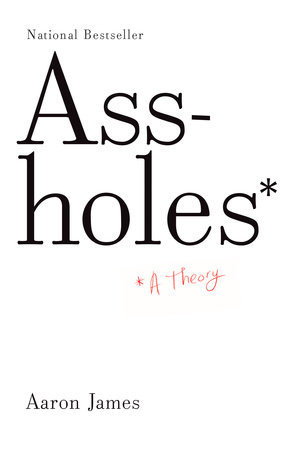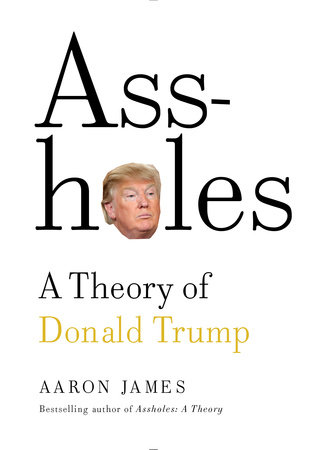Are assholes deeply confused?
Or are they just wrong?
That is, assholes could simply be in error about what they are entitled to, in a “clear-eyed” way, with no confusion or incoherence to speak of. Perhaps. But here’s why the asshole might be not only wrong but also confused.
Proper assholes seem happy to admit that they are assholes. As the onion.com headline has it, “Asshole Calls Himself an Asshole in Supreme Asshole Move.” If an asshole hadn’t yet thought of appropriating the name, he’d admire the clever strategy and proudly own it.
But here is the rub: the very idea of an asshole, in my view, implies that someone is wrong about what he is entitled to. The asshole just is the guy who takes special advantages from cooperative life when they aren’t his to have, and then vigorously defends that mistaken position from an entrenched sense of entitlement (that varies according to different asshole styles).
This is unproblematic when we say of *someone else* that he’s an asshole; we are saying he’s in error. But it is puzzling when the asshole thinks this of himself. To *regard yourself* an asshole, as assholes do, is in effect to say that you are both right and wrong, that you don’t have the entitlements that you yourself, being an asshole, think you have. And isn’t that some kind of contradiction? Is it even a coherent perspective? If an asshole could take that view of himself, is he not in some deep way inconsistent–in some deep way confused?
Here are three ways to explain what is going on. (I like the third.)
(1) True assholes don’t *really* fess up. They truly believe they have certain entitlements, and so they won’t, if they are consistent, also admit to a self-description that is tantamount to admitting that those entitlement beliefs are wrong. So when an asshole says, “Yes, I”m an asshole; deal with it!”, he’s merely taunting his subjects. He’s saying, “Yes, I am what you all would call an ‘asshole’.” He’s merely *mentioning* rather than *using* the moral term (he’s speaking “disquotationally” or in the “inverted commas sense,” as philosophers put it). The same would go for a psychopath who lacks moral concepts and yet says, “yes, what I do is ‘wrong’.” He doesn’t really believe his actions to be wrong; he merely understands how others would describe what he does and mimics that description, perhaps out of curiosity, or for purposes of better manipulating people, by being able to predict what *they* will call “wrong.”
(2) The asshole doesn’t really believe he is entitled to special advantages when he takes them. (In which case my basic analysis is wrong.) Maybe he takes them anyway, perhaps knowing, deep down, that he’s wrongfully making an exception of himself. In that case, he’s more like the insensitive jerk or dolt who won’t finally go to bat for his misconduct, except that, being an asshole, he’ll keep up a show of defense for an inordinately long time. He vigorously defends what he, in his heart of hearts, knows isn’t true.
(3) The asshole is indeed incoherent, or at least stuck in a deep internal conflict. In his normal moments of defensiveness, he vigorously defends his specific entitlements, and he believes he has them, even “deep down.” Yet in a moment of reflection, he can also correctly admit that he’s an asshole, and that he doesn’t have a lot of the entitlements he usually thinks he has.
How is that possible? Well, it *might* amount to accepting a straight-up contradiction (the asshole believes “I’m entitled to X” while at the same time believing “I am not entitled to X”). This is irrational, but perfectly possible; people do manage it. Still more realistically, the asshole’s beliefs could stand in an unresolved tension. Maybe he believes “I’m entitled to X” and “I”m entitled to Y”, etc., but also believes “A lot of my beliefs about my entitlements are mistaken.” That isn’t a logical contraction. In fact, we can all consistently hold that we are probably wrong about something or other but then defend any particular belief when we consider the matter on its merits. (Philosophers call this the “paradox of the preface.”) Indeed, to different degrees, we are all more or less in this situation.
What’s special about the asshole’s situation, then? Well, his predicament might work like this. He’ll admit that some of his entitlement beliefs are wrong, in a way that makes him an asshole from his own point of view. But he sees *no reason to find out* which particular entitlement belief is mistaken. He just carries on without sorting out which of his particular errors he is making, mainly by ignoring the issue–perhaps because he doesn’t care, or because he’d prefer the benefits he gets from being an asshole over the benefits he’d get from having a well-integrated mind. He’d rather be rich than perfectly coherent, for example. (And wouldn’t you, if you had the choice?)
The story gets more plausible when we elaborate a bit more. We can add that the asshole who calls himself an asshole (and really believes it) doesn’t take the fact that his entitlement beliefs are mistaken as a weighty reason to do anything about those beliefs. He’s wrong again on that score, since he really should think harder and better about what others can reasonably expect of him in specific situations. But this is of course just another instance of his general failure to see others as equals.
This is also another instance of the assholes’s being “immunized” (as I put it) against the complaints of other people. He’s not simply immunized against the specific objections of others, as they come up in specific situations, but against most any objections. He disregards people in that very general way. (This last nice suggestion was made, by the way, by a student during my moral philosophy class. ( The course is called “Psychopaths, Outlaws, and Assholes”; it uses those types of moral personality as a way into moral issues of social regulation in the social contract tradition.))

